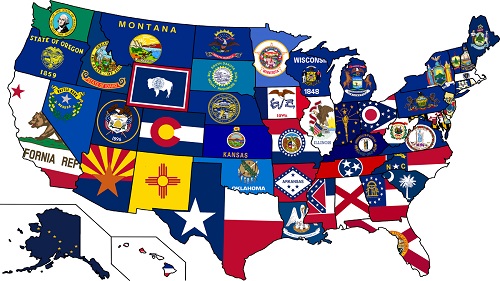During an interview on the Lions of Liberty Podcast, Libertarian Party National Committee Chairman Nicholas Sarwark called Ron Paul’s support for “states’ rights” anti-libertarian.
He had policy prescriptions that were straight-up wrong and anti-libertarian…None of us should be given a pass on having to have actual libertarian positions, or not be able to be called out when you say you oppose marriage equality. You know, that’s not a libertarian position to have. State’s rights is not a libertarian position, and it’s something Ron Paul had pushed for a long time.”
Sarwark appears to take a position common among libertarian centralizers – that they should harness and use government power to enforce their vision of liberty on society. He believes the federal government can and should mandate “marriage equality” on all 50 states.
Many libertarians take this position. They see government power as a tool to create the kind of free society they envision. While they clearly have good intentions, their strategy raises a question: can a society maintain liberty within a system that fails to address the fundamental problem of government power?
Supporters of “states’ rights” don’t believe state governments possess some kind of moral superiority over the federal government. Government power at every level restricts individual liberty. But they do recognize a decentralized system will generally preserve liberty better than monopoly government.
I need to pause here and emphasize I understand that strictly speaking states don’t have rights. Only individuals possess rights in the true sense of the word. The term “states’ rights” serves as a short-hand way of expressing the political relationship between state governments and the federal government in the American constitutional system. States do have political powers they can exercise without interference from the general government. For instance, states have the “right” (or power or authority if you prefer) to define marriage, constitutionally speaking.
Obviously, states can wield power for good or ill. Within the American constitutional system, they posses it for better or for worse. Libertarian centralizers are no more justified in using unconstitutional federal power to stop an exercise of legitimate state authority they don’t like than progressives or neocons who harness federal power for their own ends.
The issue is centralization and concentration of power in one place. Sarwark and other libertarian centralizers support monopoly government – at least when it suits their agenda. The concept of “states’ rights” roots itself in the notion of decentralization.
People arguably have more control and influence over smaller governmental units. Even if they don’t, multiple small power centers make it possible to flee from particularly oppressive jurisdictions and create an environment of “competition” between governments. Competing political entities tend to check each other’s powers. In the case of U.S. states, they can actively thwart the implementation of federal programs and the enforcement of federal laws by simply refusing to cooperate. In a monopoly government system, no such checks on power exist, and individuals have fewer options for escape if government becomes oppressive.
From a libertarian perspective, it seems if governments must exist, it is better to have power dispersed between multiple units rather than concentrated in one all-powerful centralized force. Murray Rothbard and Hans-Hermann Hoppe both argue for a decentralizing strategy to advance liberty.
Rothbard directly opposed the Sarwark strategy of using monopoly government to advance liberty, arguing instead that libertarians should use state power and the Tenth Amendment to devolve centralized authority.
In the U.S., it becomes important, in moving toward such radical decentralization, for libertarians and classical liberals — indeed, for many other minority or dissident groups — to begin to lay the greatest stress on the forgotten Tenth Amendment and to try to decompose the role and power of the centralizing Supreme Court. Rather than trying to get people of one’s own ideological persuasion on the Supreme Court, its power should be rolled back and minimized as far as possible, and its power decomposed into state, or even local, judicial bodies.”
Hoppe delivered a speech in 1997, later turned into a book titled What Must Be Done. In it, he laid out a more general path to move society toward freedom using a bottom up strategy of decentralization.
Because a monopoly of protection is the root of all evil, any territorial expansion of such a monopoly is per se evil too. Every political centralization must be on principle grounds rejected. In turn, every attempt at political decentralization…must be supported.”
The mistake libertarian centralizers make is that they think they can control the power for their own ends – to advance liberty. But the real danger is in the power itself. Once you accept the legitimacy of using government power to advance an end, you can’t put it back in the box. And when others control it, it will eventually be used against you.




